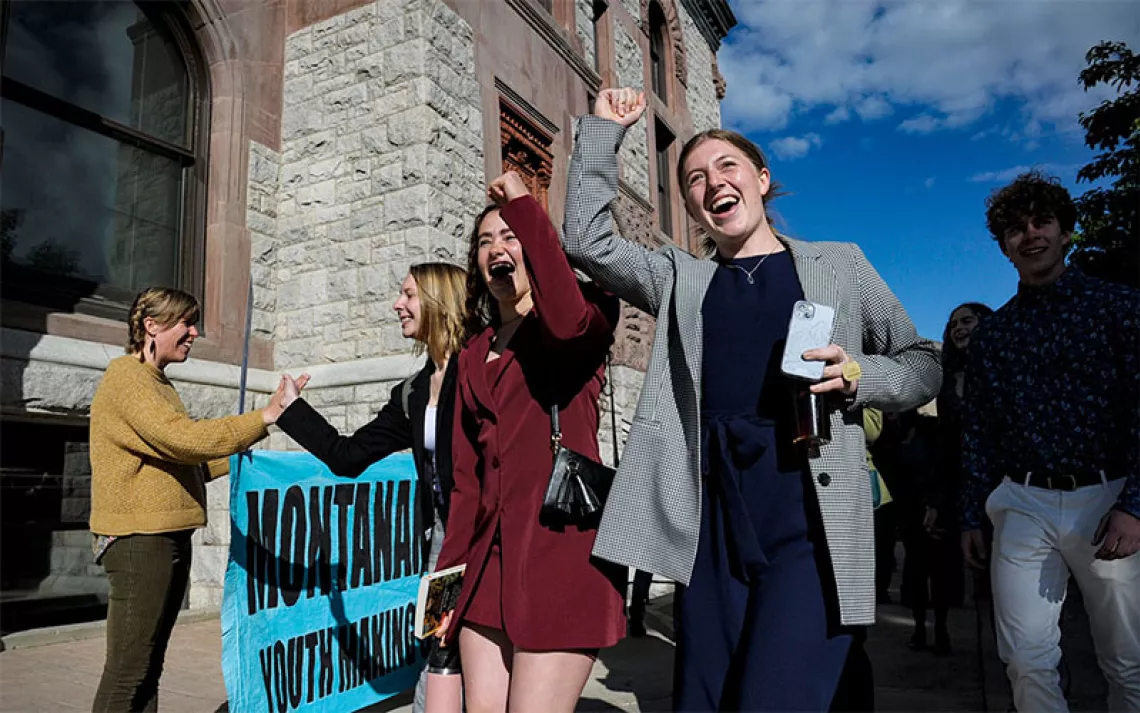Second 2020 Climate Forum Centers on the Hopes, Fears of Young People
Candidates used this forum to state their commitment to climate action

Photo by iStock
On Friday, thousands of young activists rallied in Washington, DC, as part of the global climate strike demanding action on climate change. Those in the streets called on lawmakers to address the climate crisis immediately, and many singled out President Donald Trump’s deregulatory environmental agenda.
Only a few miles away, at Georgetown University, another group of young people were also making demands on those with power and influence—only in this case, it was some of the presidential hopefuls challenging Trump.
The presidential climate change forum that took place on Thursday and Friday was the second such event to occur in September, and it drew far less media attention than the climate strikes happening elsewhere in the city and around the world. But what the forum lacked in glitz, it made up for in substance, giving candidates the chance to present their vision for climate action to an engaged audience filled predominantly with students.
“I hear too many of us applauding candidates when they say they're going to rejoin the Paris climate agreement. Dear god, that should be the cost of entry, not a badge of courage,” said Senator Cory Booker of New Jersey as he laid out his environmental-justice-centered plans.
Booker kicked off the second day of the two-part forum, hosted by MSNBC, Georgetown University, New York magazine, and the web publication Our Daily Planet. The format drew some flack from activists who have unsuccessfully called for a formal, party-sponsored climate debate. Over the course of the two-day forum, candidates appeared one by one rather than side by side, as they might have during a debate setting.
But the forum embraced its emphasis on young people. While MSNBC moderators Chris Hayes and Ali Velshi asked many of the questions, students in the audience— some of whom had slept in the venue’s hallway the night before to guarantee seating—were given plenty of opportunities to push candidates on their climate plans.
Aware of their audience, some candidates touted youth-specific proposals during the forum. At one point during her time on stage, author Marianne Williamson turned to the crowd to ask students for their feedback. “I would like to ask your opinion. I think . . . we should have a mandatory national service, one year, for people between [ages] 18 and 26, because we need you,” she said, arguing that “we need to fix this climate.”
In response, several students raised their hands, to a smile from Williamson, who said she wanted to be a “grown-up Greta Thunberg,” name-checking the famous 16-year-old Swedish climate activist who helped to inspire the massive global climate strikes.
Other presidential hopefuls acknowledged the unique fears of many young voters coming of age in the era of the climate crisis. "The planet that you and your children will be inheriting will be increasingly unhealthy and uninhabitable,” Senator Bernie Sanders, the Vermont independent, said at one point.
The forum underscored how successful youth and student activists have been in pushing climate change to the forefront of the presidential race. But in a month saturated with conversations about global warming, the forum flew under the radar—even for students themselves, many of whom prioritized the mammoth climate strike instead. And the event risked being repetitive; the MSNBC forum came just several weeks after a climate-focused town hall hosted by CNN. That seven-hour event featured 10 leading Democratic presidential candidates, including all major front-runners.
Of the top-polling candidates, only Sanders made the trip to Georgetown. Top-tier candidates like Senator Elizabeth Warren of Massachusetts and former vice president Joe Biden declined, as did California senator Kamala Harris and former representative Beto O’Rourke of El Paso. Those contenders cited other events that conflicted with the climate forum, including a town hall for LGBTQ issues in Iowa (O’Rourke attended a strike in Colorado; Biden and Warren attended climate-related events in Iowa).
While some climate activists expressed disappointment with the modest media attention and the absence of some top candidates, they conceded that the CNN forum had already pushed candidates on their climate plans. “The CNN Climate Crisis Town Hall forced all the candidates to put forward serious plans to tackle the climate crisis and answer questions from voters on them,” Stephen O’Hanlon, spokesperson for the youth-led Sunrise Movement, told The Guardian.
Despite snubs from some candidates, the timing of the second event gave it a special weight. An estimated 4 million people participated in the September 20 global climate strike, the majority of them young people. While the earlier CNN forum featured questions from members of youth-led groups like Sunrise, the Georgetown event made a point of highlighting young people as the constituent group that will be most harmed by climate change.
That youthful audience helped tease out significant policy differences between candidates on issues like fracking and nuclear power.
“Natural gas has got to be the bridge,” Representative Tim Ryan of Ohio argued. “Saying we are going to immediately ban fracking, [voters] will hear you want to take [their] jobs.”
That stance put Ryan at odds with candidates like Sanders and former housing secretary Julían Castro. Sanders has proposed immediately banning fracking; Castro, who once supported a fracking project in his home state of Texas, clarified during the forum that he now backs moving away from gas. “We need to ban fracking, beginning with fracking on public lands, and then phase out fracking for everyone else,” Castro said.
Other divisions emerged over nuclear power, long a source of controversy among rank-and-file environmentalists, climate policy wonks, and scientists. Sanders and Williamson both oppose nuclear energy, arguing that it poses too many safety and environmental issues. Booker and entrepreneur Andrew Yang, meanwhile, argued that they see no path to net-zero emissions without nuclear energy. Former representative John Delaney of Maryland tried to thread the needle between those positions. “I don't think you can be serious about climate and against existing nuclear,” asserted Delaney, who argued that currently operating nuclear plants should remain active while other energy sources develop.
Candidates also sought to highlight how far they might go to address climate change. Senator Michael Bennet of Colorado called for “a durable coalition of Americans all over this country” to work toward achieving net-zero emissions by mid-century, while Governor Steve Bullock of Montana emphasized bipartisan solutions. Mayor Pete Buttigieg of South Bend, Indiana, meanwhile promised that climate change would be a top priority in his administration. “It's bigger than one position. I think the climate czar has to be the president of the United States,” said Buttigieg as he rejected the idea that climate action might be limited to directing the Environmental Protection Agency or Department of Energy to act.
Billionaire Tom Steyer said he would be willing to use emergency powers to address climate change on his first day in office, in addition to taking on major corporations. “I’m opposed to private industry writing the rules,” Steyer said, referring to fossil fuel giants.
Even as the forum laid bare candidates’ differences, there was also much common ground, especially when it came to the potential for agriculture to become a climate action tool. “I would like to support the agriculture industry in becoming more environmentally friendly,” said Castro, who joined Ryan and other presidential hopefuls in pushing for carbon-sequestration soil practices.
The candidates at the forum were also united in their opposition to coal—a position that crossed partisan lines. Former Massachusetts governor Bill Weld, the event’s lone Republican, echoed Democrats in declaring the industry “dead” and calling it “an anchor on the rest of the world” that is preventing climate action.
Those points of consensus underscored the growing sea change on climate issues and seemed to find favor with the crowd, even as the audience thinned. Weld closed out the forum while students headed to their next event: the massive climate strike that was taking place not far away.
 The Magazine of The Sierra Club
The Magazine of The Sierra Club



